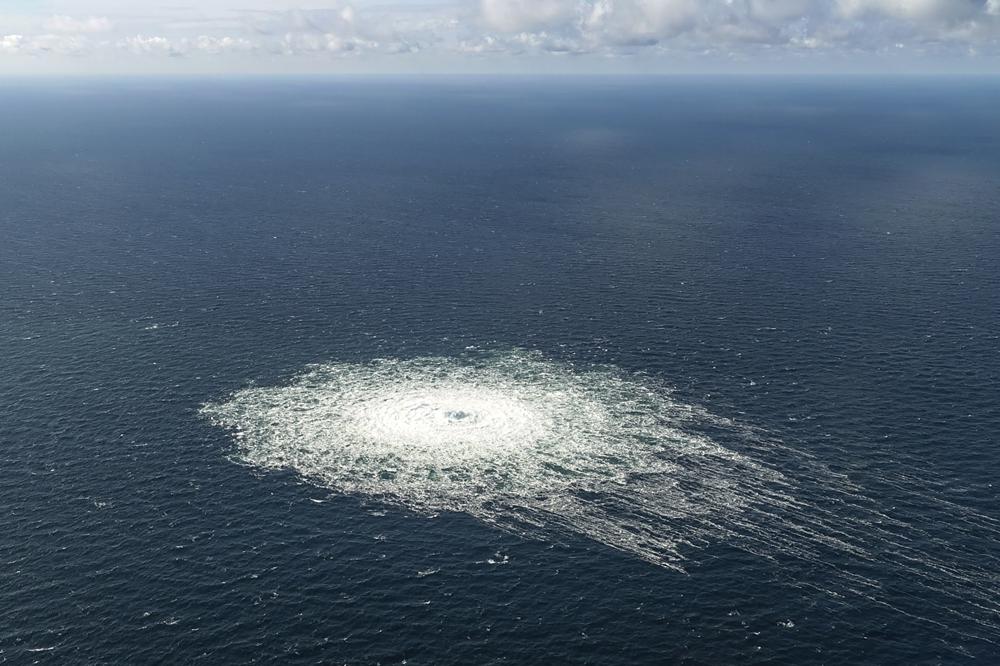A large disturbance in the sea can be observed off the coast of the Danish island of Bornholm Tuesday, Sept. 27, 2022 following a series of unusual leaks on two natural gas pipelines running from Russia under the Baltic Sea to Germany have triggered concerns about possible sabotage. Danish Prime Minister Mette Frederiksen says she “cannot rule out” sabotage after three leaks were detected on Nord Stream 1 and 2. (Danish Defence Command via AP)
BRUSSELS (AP) — The European Union suspects that damage to two underwater natural gas pipelines was sabotage and is warning of retaliation for any attack on Europe’s energy networks, a senior official said Wednesday, as energy companies began ramping up security.
The episode underscored the vulnerability of Europe’s energy infrastructure and further heightened tensions in the continent that has been rocked by t he seven-month war in Ukraine. Poland and some experts said Russia was probably to blame, and could benefit from further market instability.
Seismologists reported that explosions rattled the Baltic Sea before unusual leaks were discovered Tuesday on two underwater natural gas pipelines running from Russia to Germany. The incidents came as the EU struggles to keep a lid on soaring gas and electricity prices.
“All available information indicates those leaks are the result of a deliberate act,” EU foreign policy chief Josep Borrell said in a statement on behalf of the bloc’s 27 members. “Any deliberate disruption of European energy infrastructure is utterly unacceptable and will be met with a robust and united response.”
Some European leaders and experts pointed to possible sabotage given the energy standoff with Russia. The three leaks were reported on the Nord Stream 1 and 2 pipelines, which were filled with natural gas but were not delivering the fuel to Europe.
The pipelines allow gas to be piped to Germany without transiting through Ukraine or Poland. The extent of the damage, along with the political ramifications, raises serious doubts about the future of the Nord Stream project. Germany was heavily criticized for the project by the U.S. and many of its European partners, which said that it only increased Europe’s reliance on Russian gas imports.
While it remains unknown who might be responsible for the damage, given its undersea location, Polish Foreign Minister Zbigniew Rau said Tuesday that the leaks could be part of Russia’s hybrid war on NATO.
“The explosions took place very close to Danish territorial waters, but not inside them, because that would have meant NATO territory,” Rau said during a discussion at the Center for Strategic and International Studies in Washington.
“This could mean that someone is trying to intimidate the countries of the Baltic Sea. With the exception of Russia, all these countries are NATO members or are aspiring to membership,” he said.
Kremlin spokesman Dmitry Peskov said allegations that Russia could be behind the incidents were “predictable and stupid.” He told reporters in a conference call that the damage has caused Russia huge economic losses.
Even with eyes turning toward Russia, Anders Puck Nielsen, a researcher with the Center for Maritime Operations at the Royal Danish Defence College, said that it would be hard to establish who is responsible, and just as tough to prevent similar incidents.
“We have pipelines, we have communication cables like the internet. We have just power lines running on the seabed. All of this is vulnerable and our societies are very dependent on it. And it’s very, very difficult to monitor what’s going on and to prevent a case of sabotage,” he told The Associated Press.
The head of the Danish Energy Agency, Kristoffer Böttzauw, expects gas to keep flowing out of the holes until the end of the week. Only then, he told Danish media, can experts “try to get out and investigate what the cause is, and approach the pipes.”
The gas is not poisonous, experts say, but contains methane which is a potent greenhouse gas responsible for global warming.
A spokesman for German Chancellor Olaf Scholz declined to respond to media reports that the CIA had warned Germany earlier this summer that the pipelines could be attacked. “But let me say that according to our findings, there is no evidence that there is a natural cause for the pressure drop in the pipelines,” spokesman Steffen Hebestreit told reporters.
Borrell said the EU will support any investigation into the damage, and will “increase our resilience in energy security.”
Energy companies and governments are already acting. Norwegian state oil company, Equinor, said it has decided to raise the level of preparedness in Norway, according to national broadcaster NRK. The alert was raised overnight and applies to all of Equinor’s facilities.
Norway isn’t a member of the EU, but is major producer of offshore oil and gas. Its energy exports have surged as European countries scramble to find alternatives to Russian supplies.
The Norwegian government decided on Tuesday to boost security around its energy infrastructure, land facilities and installations on the Norwegian continental shelf after reports of an increase in unidentified drone flights.
Meanwhile, Denmark’s defense minister, Morten Bødskov, discussed the incidents with NATO Secretary-General Jens Stoltenberg. The Danish defense ministry said it also believes “that the violations occurred as a result of a deliberate act.”
Bødskov warned in a statement that “there is reason to be concerned about the security situation in the Baltic Sea region. Despite the war efforts in Ukraine, Russia has a significant military presence in the Baltic Sea region and we expect them to continue their saber rattling.”
Jan M. Olsen reported from Copenhagen, Denmark. David Keyton in Stockholm, Monika Scislowska in Warsaw, Poland, and Kirsten Grieshaber in Berlin contributed to this report.
Copyright 2021 Associated Press. All rights reserved.
Source: https://apnews.com/article/foreign-policy-sabotage-european-union-79e773da228816c1f6fdeb53211e61e9


























You must be logged in to post a comment Login